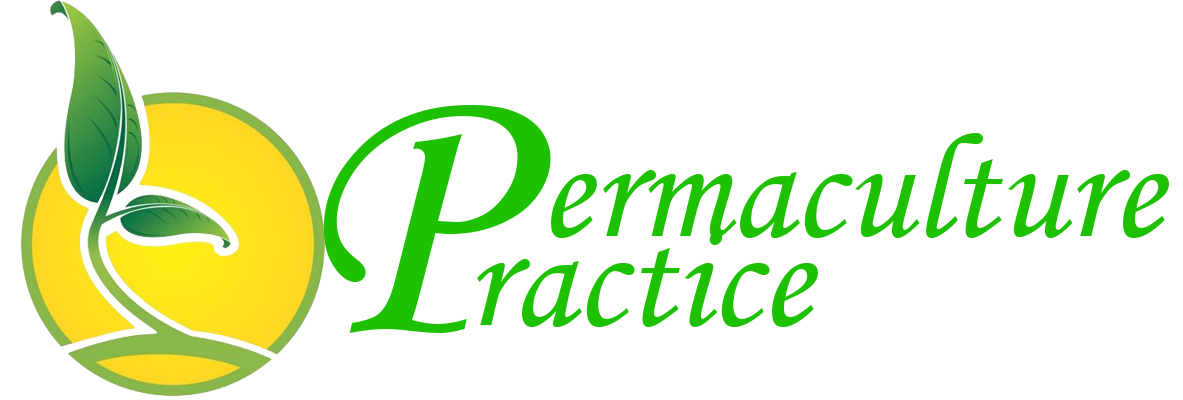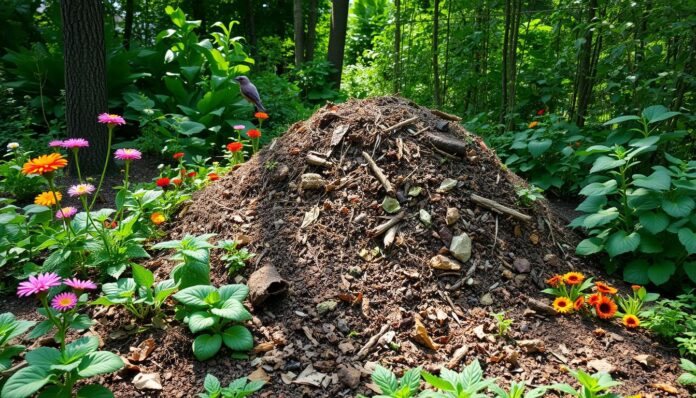What if our waste could be valuable? In permaculture, managing organic waste is key to a sustainable system. It helps us reduce waste, save resources, and boost ecosystem health. This is central to sustainable farming, where we turn waste into soil that’s full of nutrients.
Permaculture design focuses on using resources wisely and wasting less. The “Produce No Waste” principle teaches us to use everything we can. This way, we can lessen our harm to the environment and foster a more circular economy.
Key Takeaways
- Permaculture design aims to minimize waste and maximize resource efficiency
- Organic waste management is crucial for creating a sustainable and regenerative system
- Composting methods can turn waste into nutrient-rich soil amendments
- Permaculture principles can help reduce waste, conserve resources, and promote ecosystem health
- Sustainable agriculture practices, such as permaculture, can help mitigate climate change
Understanding Permaculture and Its Principles
Permaculture is a design system that aims to create a sustainable and regenerative environment. It uses eco-friendly practices to promote ecosystem services and conserve resources. At its core, permaculture is about living in harmony with nature and minimizing waste.
The principles of permaculture are rooted in sustainable agriculture. This approach seeks to produce food while preserving the ecosystem’s health. It emphasizes biodiversity, efficient water use, and soil conservation. By adopting permaculture principles, individuals can contribute to a more sustainable future.
What is Permaculture?
Permaculture is a holistic approach to designing and managing ecosystems. It involves observing and interacting with nature, catching and storing energy, and obtaining a yield. This approach can be applied to various aspects of life, from gardening and farming to community development and urban planning.
Core Principles of Permaculture
The core principles of permaculture include reducing waste, promoting ecosystem services, and conserving resources. These principles are guided by a deep understanding of natural systems and a commitment to sustainable agriculture and eco-friendly practices. By embracing these principles, individuals can create regenerative and thriving ecosystems.
Importance of Sustainability
Sustainability is at the heart of permaculture. It involves adopting eco-friendly practices that minimize waste and promote ecosystem health. By prioritizing sustainability, individuals can contribute to a more regenerative and resilient world. This approach requires a deep understanding of natural systems and a commitment to sustainable agriculture and permaculture principles.
The Role of Organic Waste in Permaculture
Organic waste is key in permaculture. It helps with composting and managing waste. This makes our environment better and more sustainable.
Types of Organic Waste
There are many types of organic waste. This includes food scraps, yard trimmings, and manure. These can be turned into compost using methods like vermicomposting or bokashi fermentation. This makes the soil rich in nutrients.
Benefits of Organic Waste Recycling
Recycling organic waste has many benefits. It reduces waste, improves soil health, and saves resources. It also cuts down on greenhouse gas emissions. This helps our planet and supports a circular economy.
Nutrient Cycling in Permaculture
Nutrient cycling is vital in permaculture. It manages organic waste to keep ecosystems healthy. By composting and managing waste, we create a system that uses resources efficiently and reduces waste.
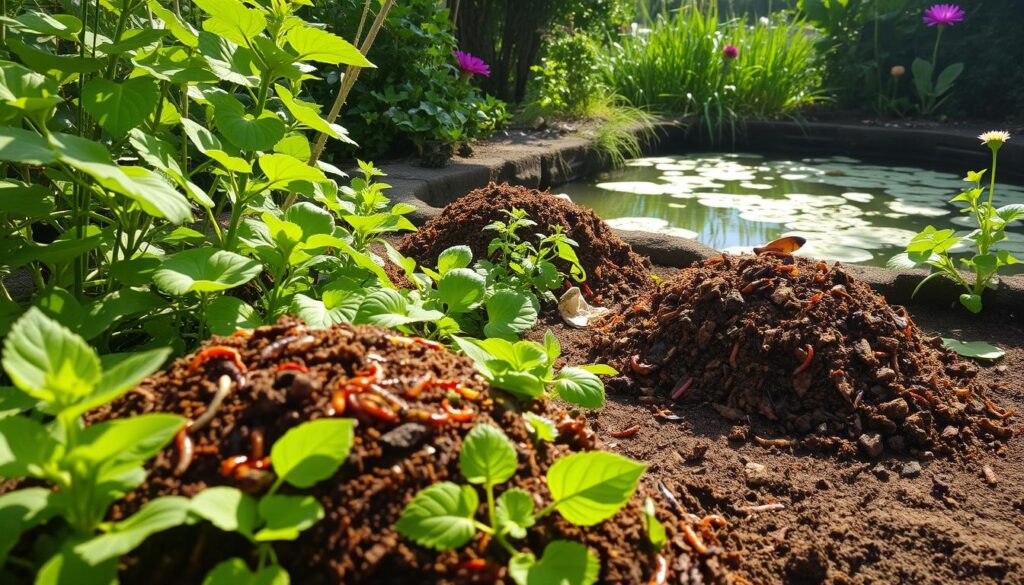
| Type of Organic Waste | Composting Method | Benefits |
|---|---|---|
| Food Scraps | Vermicomposting | Nutrient-rich soil amendment |
| Yard Trimmings | Bokashi Fermentation | Improved soil structure |
| Manure | Composting | Increased crop yields |
Strategies for Organic Waste Management
Managing organic waste well is key to lessening our environmental footprint and adopting green practices. Composting is a top choice, turning organic stuff into a soil booster. There are various composting ways, like hot and cold composting, vermicomposting, and bokashi fermentation.
These composting methods bring many perks, including:
- Less waste in landfills
- Less water and energy use
- A nutrient-rich soil for gardening and farming
Composting Techniques
Composting mixes organic stuff like food waste, leaves, and grass clippings in a certain ratio. It’s done in a compost bin or pile and needs regular care for best results.
Bokashi Fermentation
Bokashi fermentation breaks down organic stuff with microbes. It’s great for indoor composting and can handle foods like meat, dairy, and oils that regular composting can’t.
| Composting Method | Benefits | Challenges |
|---|---|---|
| Composting | Reduces waste, saves water and energy | Needs regular upkeep, space |
| Bokashi Fermentation | Handles meat, dairy, and oils, indoor use | Needs microbes, special gear |
| Vermicomposting | Fast breakdown, top-notch compost | Needs worms, specific settings |
Vermicomposting
Vermicomposting, or worm composting, uses red wiggler worms to decompose organic materials. It’s perfect for small-scale composting and can make quality compost quickly.
Designing with Organic Waste in Mind
Organic waste management is key in permaculture design. It helps create a system that regenerates and sustains itself. This method cuts down on waste and boosts soil health and biodiversity.
Composting and vermicomposting are vital in organic gardening. They turn waste into something valuable. This reduces the need for harmful fertilizers and protects the environment.
Creating Composting Areas
A good composting area is crucial. You can make one using wood or metal bins. Make sure it has enough air and moisture.
Incorporating Waste into Garden Layouts
Adding waste to garden layouts is important. It turns waste into a nutrient-rich fertilizer. This creates a cycle where waste is constantly reused in the garden.
Companion Planting with Organic Matter
Companion planting boosts soil health and biodiversity. It involves planting certain crops together. This balances the ecosystem and reduces the need for harmful chemicals.
| Technique | Benefits |
|---|---|
| Composting | Reduces waste, promotes soil health |
| Vermicomposting | Produces nutrient-rich fertilizer, minimizes environmental harm |
| Companion Planting | Enhances soil health, promotes biodiversity |
Using these techniques in permaculture design makes a system that’s sustainable and regenerative. It reduces waste and promotes environmental health. Practices like permaculture are vital for a healthy planet for future generations.
Enhancing Soil Health Through Organic Waste
Organic waste management is key to better soil health in regenerative agriculture. It helps improve soil structure, boosts biodiversity, and encourages microbial life. This method not only enriches the soil but also makes our environment healthier and farming more sustainable.
Composting, for instance, heats up to 110°F to 160°F (43°C to 71°C), killing off weed seeds and harmful pathogens. This makes the soil healthier. Vermicomposting is also great for turning kitchen scraps into nutrient-rich soil, perfect for small spaces.
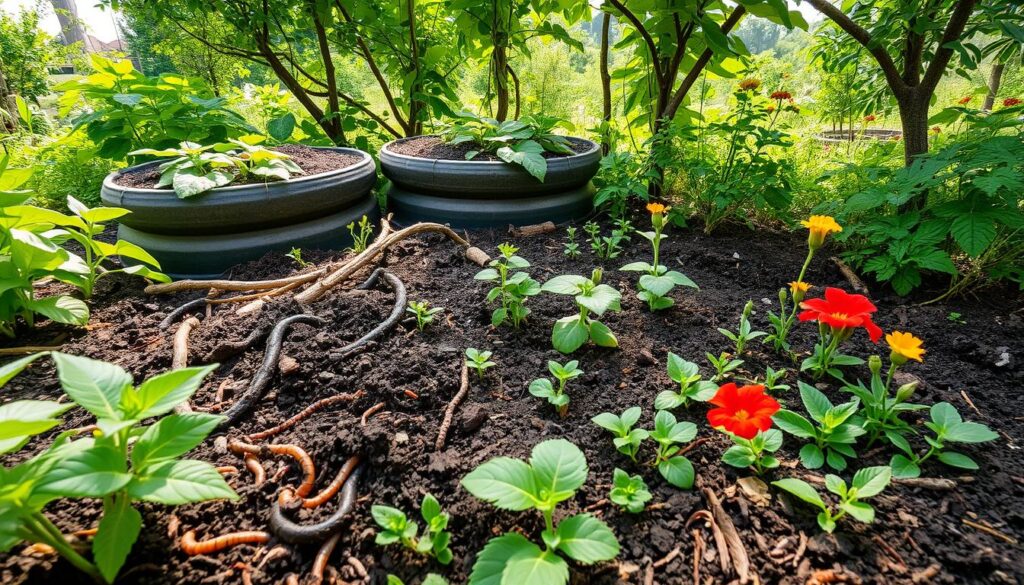
Some main advantages of using organic waste to improve soil health are:
- Soil structure and moisture retention get better
- Biodiversity and microbial activity increase
- Less need for synthetic fertilizers, supporting regenerative agriculture
Adding compost and manure teas to soil care practices boosts fertility and structure. It also improves overall ecosystem health. This aligns with regenerative agriculture and organic waste management principles.
Common Mistakes in Organic Waste Management
Effective organic waste management is key in permaculture. It helps reduce waste, supports sustainability, and balances ecosystems. Yet, common mistakes can hinder success. Overcomposting, for example, can waste nutrients and upset soil balance.
Improper waste segregation also contaminates compost, making it unfit for permaculture. Ignoring soil needs can degrade it and lower fertility. To avoid these, understanding composting and waste management in permaculture is crucial.
Overcomposting
Overcomposting happens when organic matter breaks down too much. This loses nutrients and lowers soil fertility. To prevent it, monitor composting and avoid over-processing organic matter.
Improper Waste Segregation
Segregating waste improperly can pollute compost. This makes it bad for permaculture systems. It’s vital to keep organic and non-organic waste separate and ensure compost is clean.
Neglecting Soil Needs
Ignoring soil needs is a big mistake in waste management. Soil needs nutrients, water, and air to thrive. Knowing composting and waste management in permaculture helps create a healthy soil ecosystem.
Avoiding these mistakes leads to a successful organic waste management system. This system supports sustainability, reduces waste, and balances ecosystems. By using proper composting, segregating waste well, and meeting soil needs, we can help the environment. This promotes a sustainable future and supports permaculture principles.
Tools and Resources for Effective Waste Management
Effective waste management is key in permaculture design. The right tools and resources can make a big difference. Permaculture resources like composting tools, online platforms, and workshops help manage waste well. They help reduce our environmental impact and encourage eco-friendly practices.
Important tools for waste management include composting bins, recycling containers, and sorting equipment. Online platforms and workshops also offer valuable info and guidance. These resources help us learn and apply eco-friendly practices in our daily lives.
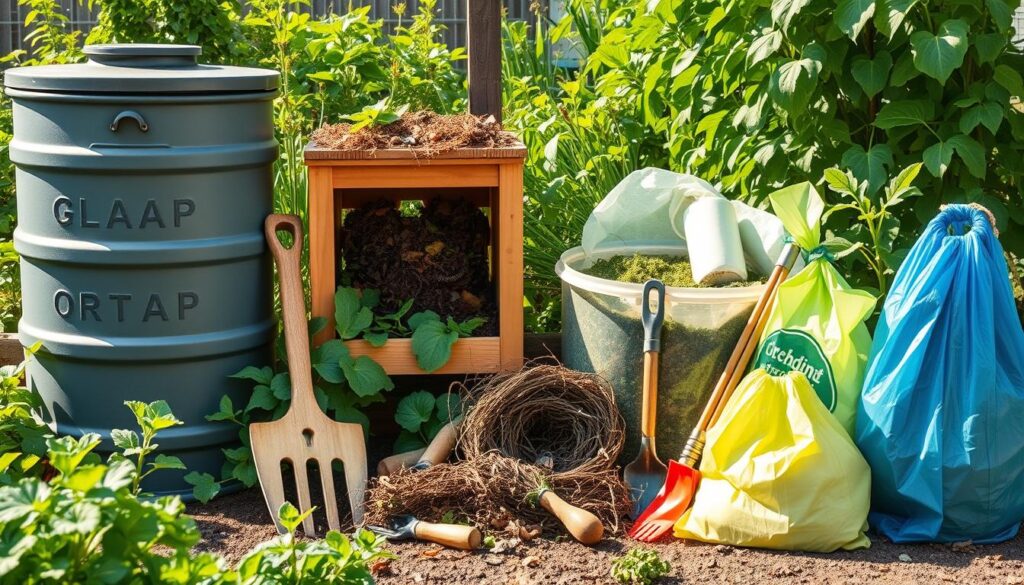
- Composting bins and equipment
- Recycling containers and sorting equipment
- Online platforms and educational workshops
- Permaculture resources and guides
By using these tools and resources, we can manage waste well. This promotes eco-friendly practices in our communities.
| Tool/Resource | Description |
|---|---|
| Composting bins | Equipment for composting food waste and other organic materials |
| Recycling containers | Containers for sorting and storing recyclable materials |
| Online platforms | Websites and online resources providing information and guidance on waste management |
Policy and Regulations on Organic Waste
It’s key to know the organic waste policy and permaculture rules for green farming. The U.S. Environmental Protection Agency (EPA) says cutting food waste by 25% could lower greenhouse gas emissions by 30%. This shows how following these rules helps the planet.
Understanding Local Laws
Local laws shape how we manage organic waste. For example, the USDA gave up to $9.5 million in 2023 for projects on composting and food waste. This money shows the government’s support for composting and the need to follow local rules.
Community Initiatives
Community efforts are crucial for green farming and less waste. Backyard composting can save cities money on trash removal. The GEOBIN Composter is a tool that can handle many types of waste, helping manage organic waste better.
Benefits of Compliance
Following organic waste policy and permaculture rules has many advantages. It cuts down on greenhouse gas emissions and saves money. By following these rules, communities can help the environment, reduce waste, and support green farming. Here’s a table that highlights some benefits of following these rules and community efforts.
| Initiative | Benefits |
|---|---|
| Backyard Composting | Reduces garbage removal costs, promotes sustainable agriculture |
| Community Composting Programs | Increases compost accessibility for farmers and gardeners, reduces waste |
| Adherence to Organic Waste Policy | Reduces greenhouse gas emissions, supports sustainable agriculture practices |
Measuring the Success of Organic Waste Practices
Effective organic waste management is key for permaculture success. We can measure this by looking at soil health, waste reduction, and crop yields. These permaculture metrics help us see how well our systems are working.
Using regenerative agriculture like composting and mulching boosts soil health. This leads to better crops and less waste. By watching these signs, we can tweak our permaculture plans for better results.
Indicators of Healthy Soil
Soil health is vital for permaculture success. Signs of healthy soil include lots of organic matter, the right nutrients, and many microorganisms. By checking these, we can see how our soil is doing and adjust our organic waste management if needed.
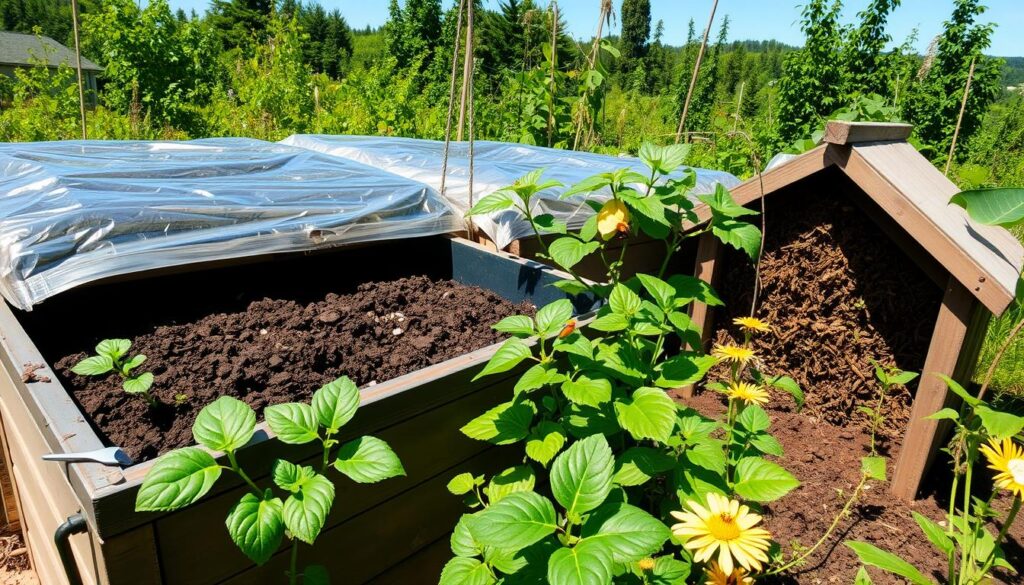
Tracking Waste Reduction
Keeping an eye on waste reduction is also crucial. By tracking waste, we can see how well our permaculture metrics are working. This helps us fine-tune our practices for better results.
By focusing on these metrics and using regenerative agriculture, we can build sustainable permaculture systems. These systems reduce waste and increase crop yields. This helps our environment and supports a greener food system.
Case Studies of Successful Organic Waste Management
Permaculture case studies show that managing organic waste is key for sustainable farming. By using permaculture, communities can lessen their environmental footprint and build regenerative systems. For instance, Kamikatsu in Japan has a waste sorting system with 45 categories. This has led to high recycling rates and less waste in landfills.
San Francisco’s composting law and Toronto’s Green Bin Program are other examples. They’ve cut down landfill waste by getting residents and businesses to comply. These stories show how organic waste management is vital for sustainable farming and less pollution.
- Capannori, Italy, started its zero waste journey in 2007. It cut landfill waste through local policies and community involvement.
- Vashon Island, Washington, gets people involved in repair and reuse. This reduces waste and promotes sustainability.
- Soneva’s resorts have cut food waste by 50%. They aim to send zero waste to landfill by 2025.
These examples show how permaculture andurban permaculturecan change communities. They promote sustainable farming practices.
Overcoming Challenges in Organic Waste Recycling
Organic waste recycling is key in permaculture, but it faces many hurdles. One big issue is dealing with odors. This can be solved by keeping a balanced compost pile with the right mix of browns and greens. Proper aeration and regular compost turning also help cut down on bad smells.
Managing pests and diseases is another big challenge. To tackle this, avoid adding meat and dairy to the compost. Also, add plants that keep pests away.
Seasonal changes can also affect recycling efforts. But, using eco-friendly methods like mulching helps a lot. Mulching keeps moisture in and weeds down. Using what you already have for building and harvesting rainwater also saves money and reduces waste.
Some good ways to beat permaculture hurdles include:
- Using upcycling, like turning big tree branches into hugelkultur beds
- Adding biochar to make soil better and hold water
- Switching to perennials to cut down on replanting and waste
By using these green practices and tackling recycling challenges, we can help our community become more eco-friendly and sustainable.
Future Trends in Permaculture and Organic Waste
The world is moving towards sustainability, and permaculture is leading the way. It’s now using new methods to manage organic waste. This shift focuses on reducing waste and promoting eco-friendly farming.
The future of permaculture and organic waste looks bright. New composting tech and education are key. These steps help us live in a more circular economy and lessen our environmental impact.
The Circular Economy
A circular economy aims to cut waste and encourage reuse and recycling. In permaculture, this means using organic materials wisely. It’s all about minimizing waste and making the most of what we have.
Advances in Composting Technology
Composting tech is getting better, with new tools and methods. From vermicomposting to bokashi fermentation, these innovations help reduce waste. They also support sustainable farming.
Role of Education
Education is key in spreading permaculture and waste management knowledge. Teaching people about sustainable farming and waste reduction is vital. It helps build an eco-conscious community.
| Permaculture Practice | Benefits |
|---|---|
| Composting | Reduces waste, promotes soil health |
| Vermicomposting | Increases soil fertility, reduces waste |
| Bokashi Fermentation | Reduces waste, promotes soil health |
By adopting these permaculture trends and waste management practices, we can build a sustainable future. This benefits us and future generations.
Building Community Through Organic Waste Practices
Community building is key in permaculture education. It helps people work together towards a common goal. This goal is to adopt eco-friendly practices. For example, the Prescott Community Compost Program made about 28 tons of compost in two years. This shows how community efforts can lead to positive change.
It’s also important to involve schools and students in organic waste practices. This education helps the next generation understand the value of sustainability. By teaching permaculture in schools, we can inspire young people to help create a sustainable future. Urban farms in Queens and Brooklyn have diverted over 600,000 pounds of waste from landfills. They also produced 350 cubic yards of compost for food producers.
Creating support networks is another crucial step in building community through organic waste practices. Connecting people and organizations helps share knowledge and resources. This leads to better waste management and sustainability. The benefits include:
- Reduced landfill waste and greenhouse gas emissions
- Increased adoption of eco-friendly practices
- Improved soil fertility and crop yields through organic mulching and composting
- Enhanced community engagement and education
| Community Compost Program | Compost Produced | Waste Diverted |
|---|---|---|
| Prescott Community Compost Program | 28 tons | Not specified |
| Urban farms in Queens and Brooklyn | 350 cubic yards | 600,000 pounds |
Conclusion: Embracing a Circular Approach in Permaculture
As we wrap up our look at organic waste management in permaculture, it’s clear that a circular approach is key for a sustainable future. Permaculture’s core is about working with nature’s cycles and cutting down on waste. By managing organic waste well, permaculture folks can build systems that are as lively and regenerative as nature itself.
The rise of permaculture shows a bigger shift towards greener living. It’s all about using less, reusing more, and recycling even more. This fits right in with the zero-waste goal of keeping all waste out of landfills. By using these waste-cutting ideas, permaculture can show the way to using resources better and lessening our harm to the planet.
The success of organic waste management in permaculture depends on us all working together. By getting local people involved, building support groups, and sharing what we know, we can all move towards a greener future. This call is for everyone – individuals, communities, and leaders – to join the permaculture movement. Let’s work together to create a world that’s regenerative and free of waste.
